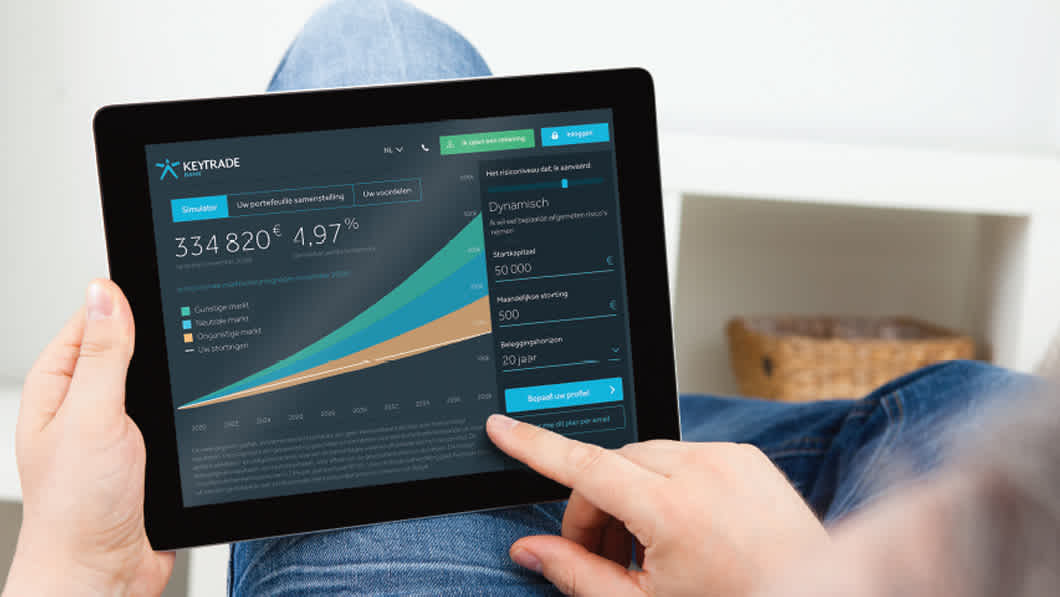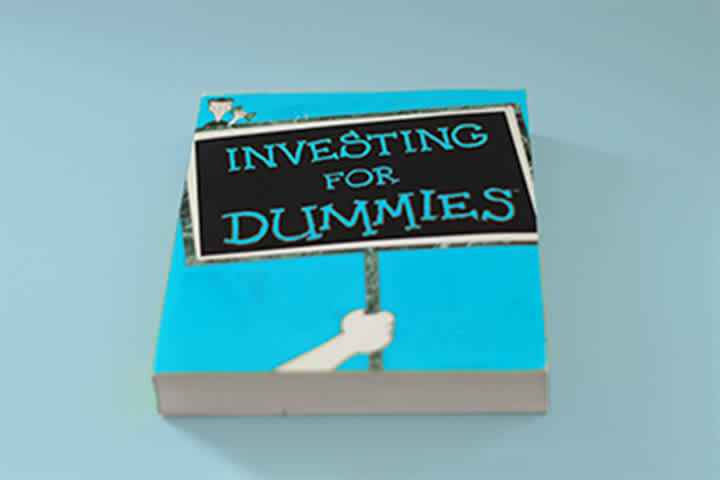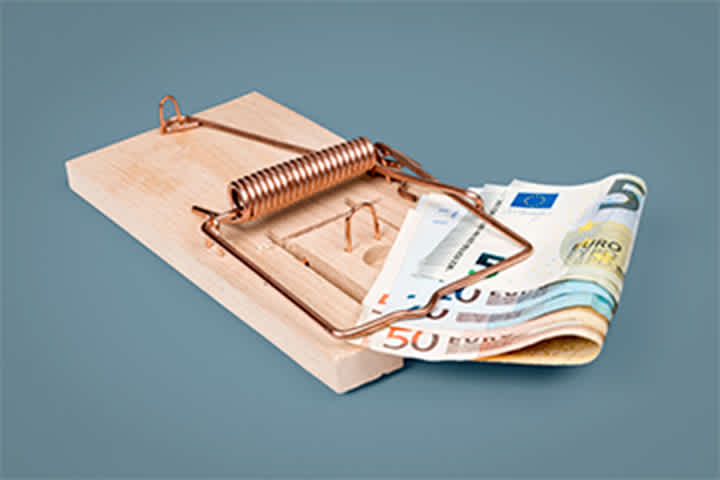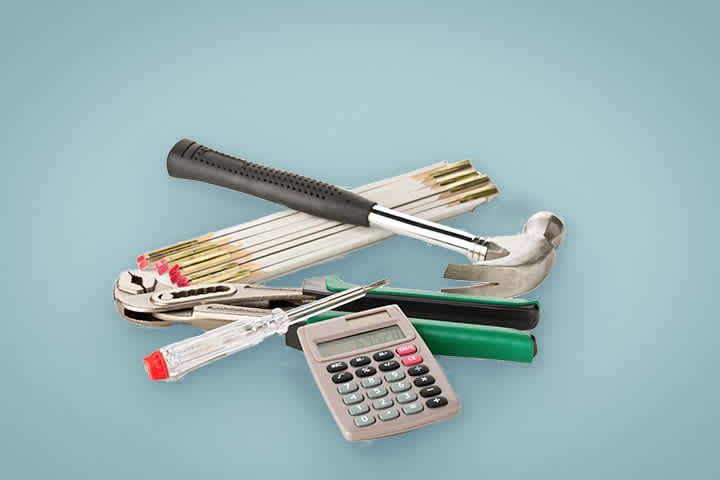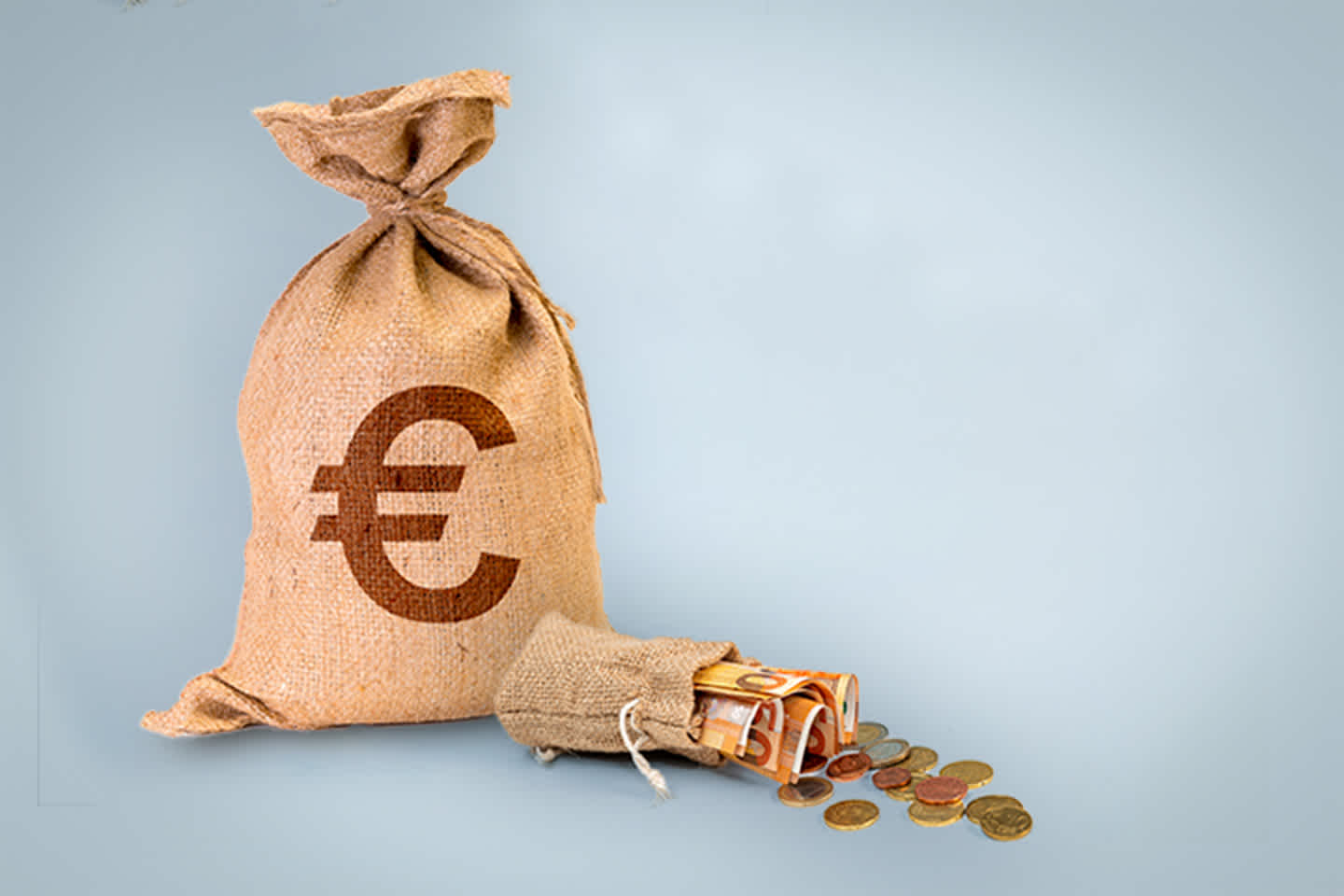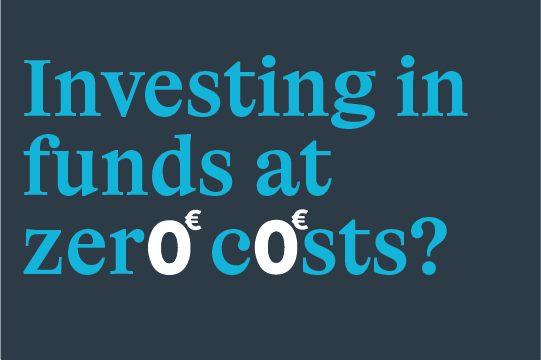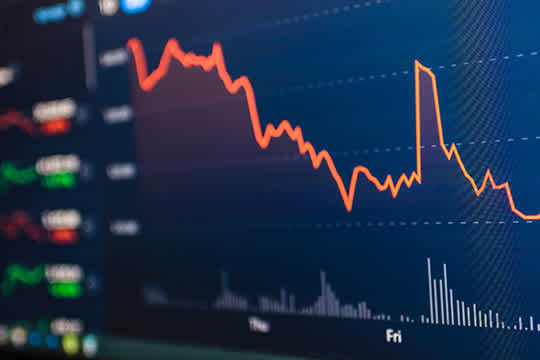5 mistakes investors make in volatile markets
Keytrade Bank
keytradebank.be
September 19, 2024
3 minutes to read
Bright green one day, dark red the next. If you take a look at the stock markets' trajectory in recent months, there is no escaping it: it has been quite a bumpy ride so far. These sudden mood swings are enough to make even the most experienced investors nervous…
1. Panic selling
It can be nerve-wracking to see your investment portfolio plummet, especially if you’ve been consistently building it up for years. The urge to stop the bleeding can be overwhelming – save what you can and then wait for the dust to settle. Ironically, this could be the worst move you can make as an investor. We don't have to go very far back in time to see this. If you had sold in a panic during the coronavirus pandemic, you would have missed some excellent years. The S&P 500 rose by 31.49% (total return) in 2019, by 18.40% in 2020, and by 28.71% in 2021*. Not bad at a time when the whole world almost came to a standstill.
*Source: slickcharts.com/sp500/returns If your broadly diversified portfolio is being hit, it's better to just sit tight. In 2007 – the year before the financial crisis – Warren Buffett placed a bet with Ted Seides, a hedge fund manager. The wager? Who would achieve the highest return in the next ten years. The prize for the winner? One million dollars. One remarkable fact is that Buffet and Seides' fight was unequal. Ted Seides was given carte blanche. He was allowed to buy and sell all kinds of financial instruments. And he could buy and sell as often as he wanted. While the hedge fund manager developed all sorts of complicated strategies, Warren Buffett only bought a single product, an S&P 500 index fund, which he held on to for 10 years. The result was clear and the fund manager threw in the towel prematurely. By the end of 2016, the S&P500 had posted an annual average return of 7.1%, while Ted Seides’ portfolio of hedge funds had been stuck at an annual average return of 2.2%. Even if the market is being shaken to its core in the short term, stay focused on the long term. If you don't need your money right away, and you have a well-diversified portfolio, sit tight. Declines are always temporary. We have seen it time and time again: there's always light at the end of the tunnel, and there tends to be far more light than darkness on the stock market.
2. Staying on the sidelines
One of the biggest mistakes investors can make is to sell their investments and then stop investing their money. This mistake actually exacerbates the damage of a panic sale. Historically, a sharp decline in the stock markets tend to recover just as quickly. The best days and worst days are often not that far apart. And if you miss those good days, you will fall much further behind. If you invested USD 10,000 in the S&P 500 back in 1994, that would give you a total return of USD 181,736 30 years later. However, if you missed the 10 best days of those 30 years, your final return would be 54% less (USD 83,272). And if you missed the 20 best days of those 30 years, your final return would be 73% less (48 874USD ). If you did sell in a panic, your best option is to reduce your cash position again and return to the market, particularly if you are holding more cash than you need. One way that you can avoid panic selling (and then being sidelined) is to make periodic investments. This means investing a set amount on a regular basis, for example monthly, regardless of the market conditions. This offers two advantages: you avoid the timing pitfall, and you take the emotion out of your investment decisions. This can also put investors' minds at ease as they gingerly re-enter the market after a decline. After all, this means they do not have to invest all their money at once, which can be less stressful in volatile times. Once the market starts to rise again, you will also be pleased that you put in your money a little bit at a time. This avoids the risk of staying on the sidelines for too long and missing out on important opportunities once the market recovers. The trick is to balance patience and action, and a periodic investment strategy can play a key role in this.

3. Overconfident behaviour
Overconfidence is an often underestimated pitfall for investors, especially in volatile markets and especially for investors in individual shares with a portfolio that is not very diversified. It may seem tempting to think that you can strike a bargain at the right time or that you know exactly when a share has bottomed out. This phenomenon known as anchoring means that investors fixate on a much higher share value from the past without taking into account the current market conditions or the potential for further decline. Even experienced investors get overconfident. This often leads to impulsive decisions aimed at short-term profit that end up undermining the portfolio's stability. Short-term trading may seem profitable on paper, but in practice it is particularly difficult to keep hitting a bull's eye. The reality is that the markets are volatile, and even the most skilled investors can get their timing wrong. So what can you improve? You can build a solid foundation with diversified investments. Rather than go after individual shares, you should consider more stable options such as investment funds or ETFs tracking a broad market index. Are you investing in an AI share and you still want to capitalise on this theme? Consider selling the share and investing your funds in an ETF that tracks dozens of AI shares. This allows you to even out some volatility. A well-diversified portfolio is essential to manage risks, especially in uncertain times. Investors who invest too heavily in a single share, sector or asset class run the risk of being disproportionately hit when it comes under pressure. Striking a good balance can help to absorb the impact of volatile markets and increase your portfolio's overall stability.
4. Trying to make up for losses quickly
Another common mistake investors make in volatile markets is they try to make up for their losses by making riskier or rushed decisions. Instead of calmly rebuilding their portfolio in a structured way, they take risky positions in the hope of a rapid recovery. Say you took a significant loss on a particular investment: the natural response might be to invest in a share that has fallen sharply very quickly, with the expectation that it will also recover quickly. This is a dangerous wager, though. Not only can the markets fall further, but your impulsive choice to 'reinvest' in something that looks like a bargain may lead to even greater losses. Another example is the rapid shift of investments towards so-called 'high-flyers’, shares that performed better during a crisis such as value stocks or shares in defensive sectors (such as healthcare or food). This strategy may seem logical, but these shares may already be overvalued. Moreover, what went up in the past does not always keep going up in the future. What can you do to avoid this pitfall? The answer is discipline and realism. Instead of trying to make up for your losses in a hurry, it is important to stay true to your long-term strategy. Temporary dips are part of investing. The best way to deal with them is to truly diversify your portfolio in advance, for example with ETFs. Losses sometimes takes longer to recover than you had hoped, but your patience will often be rewarded.
5. Not rebalancing your portfolio
In the event of a sharp correction, different asset classes such as shares, bonds, commodities and gold often don't move in the same direction. When shares are hit, we often see bonds or gold doing better. This means your portfolio's asset allocation may become unbalanced. Whereas you may initially have had a nice mix of 70% of your portfolio allocated to shares and 30% to bonds, for example, a sharp drop in the stock market could mean that 50% of your portfolio now consists of shares and 50% bonds. This can change your risk profile significantly without you having actively chosen to do so. Not rebalancing your portfolio is therefore a common mistake. Rebalancing means adjusting your investments to get back to your original asset class allocation that corresponds to your risk profile and objectives. This may mean, for example, buying shares after a sharp fall and selling bonds to rebalance the asset allocation. By rebalancing your portfolio, you can take advantage of buying opportunities when the prices of certain asset classes have fallen and you can prevent your portfolio from relying too much on asset classes that have risen in value. In the long term, this will help you to optimise your return and keep the risk under control.
Other articles that might interest you
![blogHeader-taxeRent]()
Rental income and taxes: what every landlord should know
![blogHeader-compromis]()
An offer, an option agreement or a contract: ending the confusion
![blogHeader-renov]()
Investing in your partner’s home? Don’t make these mistakes!
![blogHeader-SchenkingRegistreren]()
Gifting money: register or take the risk?
![blogHeader-USRecession]()
Will there be a recession in the US?
![blogHeader-cruise]()
As cruise companies gather steam, are their shares doing the same?
![iPad]()
Monthly video 2025
![blog-InvestingFor]()
A beginner's guide to buying shares in five steps
![blogHeader-Tesla]()
Is Elon Musk about to crash Tesla shares?
![GraphOfTheWeek]()
American optimism reversing: time to head for the exit?
![blogHeader-kostenAamkoo]()
What costs are involved in buying a home?
![Defensieaandelen]()
An investment guide to Europe's military resurgence
![blogHeader-Aristo]()
Dividend aristocrats: a good beginner investment strategy?
![blogHeader-tax]()
Capital gains tax: who can escape and who will pay?
![iPad]()
Monthly video 2024
![blogHeader-SmallInvest]()
Investing when money is tight: being ambitious pays off!
![Blog-Header-Invest?]()
What is investing, and why is it an option for you?
![blog-donation-3]()
Married, cohabiting or in a non-cohabiting relationship: the impact on gifts and legacies
![blogHeader-TestamentScr]()
Writing your own will? Avoid these 10 mistakes
![blogHeader-Wallonie]()
Stamp duty and inheritance taxes are set to fall sharply in Wallonia
![blog-inheritanceT]()
What if you are unable to pay the inheritance tax?
![blogHeader-donation]()
Want to fit in a gift before the end of the year and avoid paying gift tax?
![blogHeader-Trap]()
What you need to know before you start dividend investing
![blogHeader-vastgoedInve]()
10 tips for the novice property investor
![pension pilars]()
Start growing your pension sooner rather than later
![blogHeader-Lifetime]()
Lifetime pension savings: the sooner you begin, the more you rake in
![blog-DatingApp1]()
What if pension savings were like a dating app?
![blogHeader-mythes]()
Myth busters: 5 myths vs. facts about pension savings
![blogHeader-Pensionsav]()
Pension savings: save the grey hair for later
![Woman lying down in a hamac on a terrace]()
Passive investing: less effort for a better return
![blogHeader-renteloos]()
Which loan is the best fit for your renovation project?
![blogHeader-1KeerBeleg]()
Lump-sum investing vs cost averaging: which offers the highest return?
![Newspaper with ETF's circled in red, a red pen and a magnifying glass on top]()
What is a tracker and how do you choose the right one?
![blog-EpargeEnfant]()
How can you teach your child to save? 12 tips
World Cleanup Day
![blogHeader-Password]()
Have a password manager on your cybersecurity checklist yet?
![Fishing per post]()
Scam letters are back (even though they never really went away)
![Active ETF]()
Actively managed ETFs: the best of both worlds?
![termijnrekening]()
Government bonds, savings accounts, or term accounts: which should you choose?
![blogHeader-InvestFood]()
6 reasons to invest in food
![belgian-shares 1908487531]()
Investing in Belgian shares: the dangers of too many domestic securities
![untaxed-side-jobs 1913883895]()
Untaxed side jobs: what is allowed and what is not (any more)?
![pay-favourite 1835827360]()
Investors, never pay too much for your favourite share!
![IT]()
Who's who at Keytrade Bank? Who answers the phone when you call us?
![IT]()
Who's Who? Visiting IT
![student-room 262331855]()
Would it be better to buy a student room than rent one?
Investing in football shares: what's the score?
![blog-Basisrente]()
Basic interest rate and loyalty bonus: what does your savings behaviour say about you?
![blogHeader-RelatieBreuk]()
What happens to the shared home when a relationship breaks down?
![blogHeader-ValseVacatur]()
Watch out for recruitment scams
![Graph of the week]()
Europe is no longer falling behind!
![blogHeader-Veilig onlin]()
Secure online banking: how can you protect your finances?
![blogHeader-SparenVoorKi]()
How can I invest or save better for my child?
![trackers capi-distri]()
The difference between distribution and accumulation for funds or trackers
![Graph of the week]()
Is joining the BEL20 actually good for you?
![blog--Récupérémaxleeftijd]()
Age limit for a mortgage loan: is it true?
![blog-compromis]()
From offer to contract: avoid these errors
![blog-romanceScamm]()
Online dating scams: tips to protect yourself
![Graph of the week]()
Can we still say "Magnificent Seven"? Or should it be "2 Unlimited "?
![blog-leningzonder]()
A no-deposit mortgage loan: fact or fiction?
![blogHeader-ZelfOfLaten]()
Invest yourself or have someone do it for you: do you have to choose?
![tell-tax-man 1044303100]()
What do you have to tell the tax man about your money and investments?
![house-flipping 330509387]()
New in Flanders: interest-free loans for renovations
![iPad]()
Monthly video 2023
![shopping-online 1469785070]()
Shopping online: 7 tips and points to consider
![Image article small caps]()
Small company shares with big opportunities?
![panneaux solaires]()
6 reasons why installing solar panels is still worthwhile in 2024
![Picture article gold]()
Golden days? Why to invest in gold (or not)
![blog-aLouer-TeHuu]()
Is a buy-to-let property a smart investment?
![roerende voorheffing]()
Exemption from withholding tax on dividends
![Seasons greetings]()
Looking back on 2023
![Photo article challenges stock investor]()
Will bonds beat shares in 2024?
![blog-DigitalHerit]()
Will AI replace human investment advisers?
![blog-short]()
Shorting: what is it and how does it work?
![blog-goldenRules]()
The 10 principles of stock market success
![payer sans contact]()
The advantages and disadvantages of contactless payment
![blog energyInvestment]()
How to invest in the energy transition?
![qd code fraude]()
Read this before you scan another QR code
![padel header]()
Good positional play is important!
![inde2]()
Is India the new China?
![KNEWS 2307 Padel]()
Padel has got a new doubles partner with Keytrade Bank
![blog-PID]()
Everything you need to know about the post-intervention file
![nervous-stock-market-200days-moving-average 534464629]()
Get ready for the last quarter!
![Biodiversity]()
Investing in biodiversity: can Wall Street save the rainforest?
![blog-DigitalHerit]()
Don't forget to make arrangements for your digital estate
Investing in AI: hype or a ticket to the future?
![blog-savingForSak]()
Saving for the sake of saving? Or with a goal in mind?
![blog-PrepareYours]()
How do you prepare financially for a longer life?
![blog-Recession]()
Handling recessions: a manual
![blog-inequal incomes]()
How to navigate a relationship with lopsided incomes?
![blog-financial conflict]()
Avoiding and dealing with conflicts on financial matters: a guide
![blog-sellInMayAndGoAway]()
Sell in May? Is it really such a good idea?
![blog-compte join]()
1 account for the both of you? Or separate accounts? Or a combo?
![myth-sustainable 1059639044]()
Make an impact with your Keyprivate
![diversification]()
How much diversification is enough for your portfolio?
![KID eurosign]()
From KIID to KID: new rules, better investment decisions
![intelligent mobility]()
Which investment opportunities are available on the road to smart mobility?
![blog endOfAmericanHegemony]()
Is the end nigh for American dominance?
![blog healthcareInvestment]()
A vitamin shot for your investments
![blog waterInvestment]()
Does water earn a place in your portfolio?
![Bonds]()
Bonds to rise in 2023?
![Visa Platinum on Silvery Background (top block)]()
6 things you need to know about your Keytrade Bank credit card
![iPad]()
Monthly video 2022
![keytrade-nature-trail 474489556]()
A Keytrade Bank Nature Trail? Yes, please.
![equity-investors-economic-data 1891162513]()
What is technical analysis and how does it work?
![AchatPensionComp]()
How to buy real estate with your supplementary pension (even though you have not retired yet)
![Product Owner of our Data Department, Damien Hegarty]()
Who's who at Keytrade Bank? Data first
![Funds for free]()
Less costs? Yes, please.
![situation-russia-ukraine 1924764779]()
The situation following the Russian invasion of Ukraine
![something-new-investment-world]()
There's something new in the air in the investment world!
![thematic-funds 530010547]()
6 points to consider for thematic investing
![monetary-policies-brake-stock-market-upturn]()
Is tighter monetary policy acting as a brake on the stock market upturn?
![donate-to-charity 1854854632]()
How can you donate or leave a legacy to a charity?
![close-possible-staff 69329]()
As close as possible to staff
![keytrade-nature-trail 474489556]()
A Keytrade Bank Nature Trail? Yes, please.
![esg-rating 1169454484]()
How do you find out what a company’s ESG rating is?
![esg-alphabet]()
ESG's alphabet
![ferrari-syndrome 1945800565]()
How much additional income are you allowed to earn as a pensioner?
![invest-success 1033103851]()
All in our fund market at the same price
![impact-luck 1085827403]()
How to invest if you're on a tight budget
![Geert Van Herck]()
Monthly video 2021
![inflation 2023622432]()
Hate budgeting? This is your guide to budgeting
![investment-podcasts 1433456570]()
Podcasts about money and investments (part one)
![stop-loss 2063917100]()
No group insurance plan? What are the alternatives?
![global-world-index 289143614]()
Can countries go bankrupt?
![inflation-commodities 1046709259]()
Inflation? Grab some commodities for your portfolio!
![choose-trackers 1382662748]()
How to choose a tracker (ETF)
![safe-investing 268438862]()
Gold, cash and government bonds: how safe are safe havens?
![co-housing-rules 1613595520]()
Cohousing rules
![baby-on-way 1095110102]()
Baby on the way? Make sure your finances are ready for it, too
![buffet-bezos-musk-p-KCm6xB9I-unsplash]()
The halo effect: why we are buying the shares of Buffett, Bezos and Musk
![investing-for-your-child 1340966087]()
Why investing for your child is a good idea
![timing-is-everything 390959932]()
Timing is everything: how to choose the right time to enter the stock exchange?
![iPad]()
La technologie préserve les investisseurs contre l'utopie
![funadamental-analysis 1555072109]()
What is fundamental analysis, and how does it work?
![protect-money-hackers 1859124007]()
How to protect your hard-earned money from hackers
![include-grandchildren-inheritance 1009930174]()
How to include your grandchildren in your inheritance planning: 8 questions and answers
![micro-caps 516415369]()
Why (not) invest in micro-caps?
![safe-contactless 1931956346]()
How safe are contactless payments?
![rent-or-buy 1568837434]()
Rent or buy? How to use the price-to-rent ratio
![treacherous-stock-market 1033103887]()
The treacherous stock market
![society-without-cash 1932714896]()
On the way to a society without cash?
![second-residence 2015005337]()
Buying a second residence: with savings, investments or a loan?
![second-hand-online 571885318]()
A must read for when you spotted a second-hand bargain online
![math-stock-market 68612446]()
Maths on the stock market
![impact-luck 1085827403]()
The impact of luck on investments
![handiest-financial-apps 1008711622]()
The handiest financial apps (and free as well)
![equity-investors-economic-data 1891162513]()
Equity investors look beyond gloomy economic data
![7-investment-themes 272484338]()
7 investment themes for 2029 (for which you can get a head start already)
![10-rules-lifelong-success 1761072161]()
Ten basic rules for lifelong success on the stock market
![economy-dip 1912291450]()
Any dip in the global economy appears to just a passing blip!
![seven-myths 1756375427]()
Seven investment myths
![blended-family 1563671599]()
Blended family: shared savings account or keep things separate?
![emerging 1050235859]()
Emerging countries are lagging behind!
![tip-password-safe 735137110]()
Tips from an expert: how to keep your passwords safe
![coronablog 1670847745]()
Coronavirus blog Geert Van Herck: Property once again fails to deliver diversification bonus
![gift-inheritance 1661226916]()
Gift or inheritance: which is the most tax-efficient?
![offer-property 1982828150]()
Making an offer on a property: what should you look out for?
![car-to-bike 1250798269]()
Swapping your car for a bike: how much money could you save?
![china-dollar 1818989204]()
Can China make the dollar crash?
![ferrari-syndrome 1945800565]()
Afraid of causing Ferrari or hammock syndrome? This is how you can make a gift and stay in control
![us-dominance 1664904235]()
US stock market dominance not coming to an end yet!
![investment-podcasts 1433456570]()
Podcasts about money and investments (part two)
![mining-sector 1741881131]()
Anxious about inflation? Have you ever considered the mining sector?
![msci-emerging 129310280]()
Will the MSCI Emerging Markets index become the next big thing?
![inflation-savings 1051141721]()
What does higher inflation do to your savings and investments?
![invest-success 1033103851]()
How can you invest successfully?
![share-suits-you 1134551189]()
Which shares suit you?






